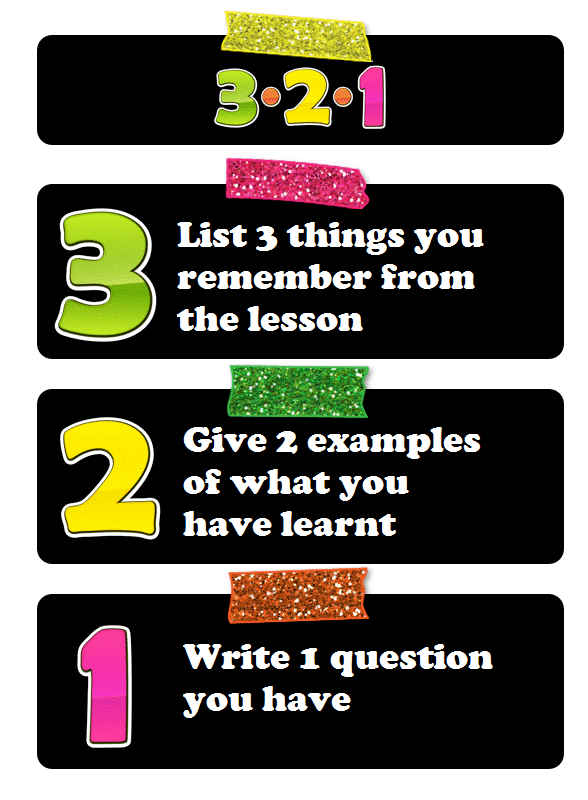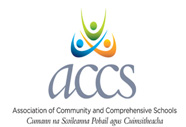Student Reflection
In this current academic year, 2017-18, we are continuing to implement the aforementioned effective questioning strategies and embed them in the teaching and learning that occurs in our school. We are further building on these with an emphasis on the use of the reflection number line. We aim to encourage students to reflect in and on their learning by using the reflection number line to rate their level of understanding on it and then to consider the following questions:
• What I know/ understand?
• What I do not know/ understand?
• What I need to learn in order to connect all parts of what I have learned?
• How would I do it differently next time?
• How could I progress?
As a result it aims to promote deeper thinking and learning. This strategy reinforces the use of previously embedded strategies such as the use of integers and timing in terms of formulating a plan to improve their learning.

3-2-1 strategy
This strategy may be displayed on a post-it and placed on the ‘Tweet board’ for the teacher to read. This strategy may be used in a variety of contexts: for student self-assessment, peer-assessment, student feedback to the teacher, or used as a means of highlighting questions that still remain at the end of a lesson or topic. It encourages students to think about their learning, and to reflect on their current understanding and how they could further build on and develop that understanding.

Tweet board (in conjunction with 3-2-1 strategy):

The tweet board is a visual display that may be used in pre-teaching a topic, providing student feedback during a lesson, or as a means of consolidating the learning that has taken place and getting feedback on student’s level of understanding after a lesson. It may be used also as a means of seeking questions that still remain in student’s minds, or as an avenue for exploring topics that students would like to investigate. The tweet board also works very effectively when used in conjunction with the 3,2,1 strategy previously outlined.
Success Criteria:
Building on the implementation and embedding of effective questioning strategies and reflection, in 2016 a focus was placed on the area of success criteria. The focus on success criteria was as a result of an organic development from the previously embedded assessment strategies in JTBCS.
Also, as part of the new Junior Cycle, students develop eight key skills. Two of these skills, ‘Managing Information and Thinking’ and ‘Managing Myself’ are central to all subjects studied at Junior Cycle. The use of success criteria in teaching and learning, also serves as a means of encouraging the development of these particular skills.
Success criteria is where a student makes a conscious effort to think about what must be, what should be and what could be in a particular piece of work. Students are encouraged to use success criteria to explore, discuss, plan and create. By asking the key questions ‘What must I do?’, ‘What should I do?’ and ‘What could I do?’ students become more focused on the task at hand. Success criteria enables students to become more capable and exact in both self-assessment and peer assessment. It is particularly useful for students in planning their work. It helps them to respond to a task in a focused manner. It is also beneficial as a revision or editing aid, where there may be gaps in their learning.
Critical Verbs

The focus for S.S.E. in this academic year (2017-2018) is to develop students’ understanding of critical verbs. This will build on previous strategies already embedded in the school namely numeracy, literacy, effective questioning and reflection. Student focus groups conducted in 2017 and 2018, at both junior and senior cycle, highlighted the need to address the area of critical verbs. It was evident that some students did not understand many of the critical verbs used commonly across many subjects, limiting their ability to answer questions effectively and to assess each other’s work. Informed by both student and teacher voice, ten critical verbs were selected to focus on. By addressing the meaning of these verbs, students will be better equipped to understand questions posed and they will be more confident in effectively assessing their own individual work and in giving feedback to their fellow students. This, it is envisaged, will lead on to a focus on peer assessment in 2019.

